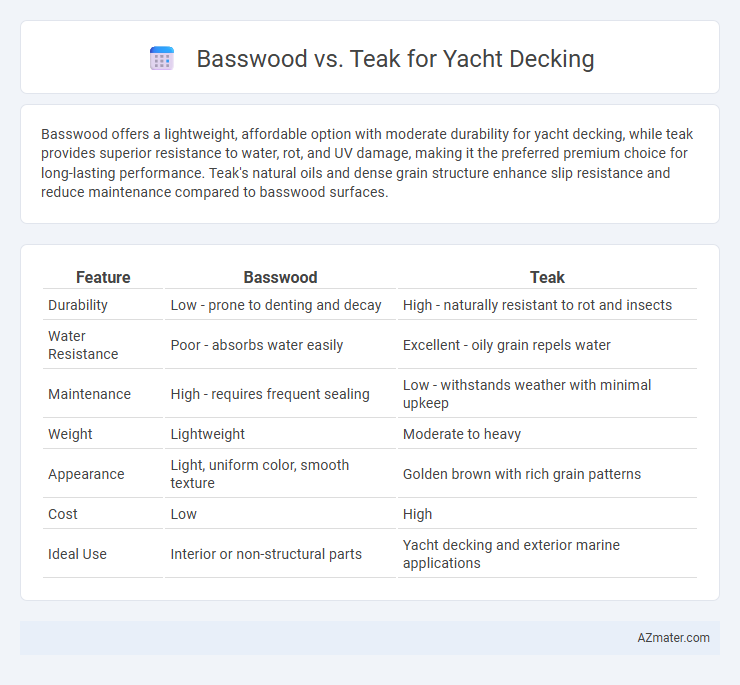Basswood offers a lightweight, affordable option with moderate durability for yacht decking, while teak provides superior resistance to water, rot, and UV damage, making it the preferred premium choice for long-lasting performance. Teak's natural oils and dense grain structure enhance slip resistance and reduce maintenance compared to basswood surfaces.
Table of Comparison
| Feature | Basswood | Teak |
|---|---|---|
| Durability | Low - prone to denting and decay | High - naturally resistant to rot and insects |
| Water Resistance | Poor - absorbs water easily | Excellent - oily grain repels water |
| Maintenance | High - requires frequent sealing | Low - withstands weather with minimal upkeep |
| Weight | Lightweight | Moderate to heavy |
| Appearance | Light, uniform color, smooth texture | Golden brown with rich grain patterns |
| Cost | Low | High |
| Ideal Use | Interior or non-structural parts | Yacht decking and exterior marine applications |
Introduction: Why Yacht Deck Material Matters
Yacht deck material significantly affects durability, maintenance, and overall aesthetic appeal, making the choice between basswood and teak crucial. Teak's natural oils offer superior resistance to water, rot, and UV damage, ideal for harsh marine environments. Basswood, while lightweight and easy to work with, lacks teak's resilience, leading to faster wear and increased upkeep in yacht decking applications.
Overview of Basswood and Teak for Decking
Basswood is a lightweight, soft hardwood known for its fine, uniform texture and resistance to splitting, making it suitable for indoor yacht decking but less ideal for exterior use due to lower natural durability. Teak, a dense, oily hardwood prized for its exceptional water resistance, natural oils, and ability to withstand harsh marine environments, remains the industry standard for yacht decking, offering superior durability and a non-slip surface. The choice between basswood and teak depends on balancing cost, maintenance, and exposure conditions, with teak providing unmatched longevity and weather resistance for outdoor marine applications.
Physical Properties Comparison: Basswood vs Teak
Basswood has a density of around 0.35 g/cm3, making it lighter and less durable compared to teak, which has a density of approximately 0.66-0.75 g/cm3, providing superior strength and resistance to wear. Teak's natural oils provide excellent water resistance and durability, essential for yacht decking exposed to marine environments, whereas basswood lacks these oils, making it more prone to moisture damage and decay. The hardness of teak, measured around 1,070 lbf on the Janka scale, far exceeds basswood's softer rating near 410 lbf, ensuring better impact resistance and longevity under heavy foot traffic on decks.
Durability and Lifespan in Marine Environments
Teak outperforms basswood in durability and lifespan for yacht decking due to its natural oils and dense grain that resist moisture, rot, and marine pests. Basswood lacks inherent water resistance, making it susceptible to swelling, warping, and faster deterioration under constant exposure to saltwater and sun. Teak's proven longevity in harsh marine environments justifies its higher cost for premium yacht decking applications.
Maintenance Requirements: Basswood vs Teak
Teak yacht decking demands minimal maintenance due to its natural oils and dense grain, providing excellent resistance to rot, insects, and water damage. Basswood, being softer and less oily, requires more frequent sealing and protective treatments to prevent moisture absorption and deterioration in marine environments. Regular cleaning and upkeep are essential for basswood to maintain durability comparable to teak's low-maintenance performance on yacht decks.
Resistance to Moisture, Rot, and Pests
Basswood offers moderate resistance to moisture but is more susceptible to rot and pests compared to teak, making it less ideal for yacht decking in harsh marine environments. Teak is renowned for its exceptional natural oils and dense grain, providing superior resistance to moisture, rot, and marine pests, which enhances durability and reduces maintenance needs on yacht decks. The high silica content in teak wood also contributes to its strength and longevity, outperforming basswood in withstanding the challenges of exposure to saltwater and sun.
Aesthetics and Color Retention
Basswood offers a pale, creamy appearance that lightly ages over time, providing a clean and understated aesthetic ideal for modern yacht decking. Teak boasts a rich, golden-brown hue with natural oils that enhance its color retention and develop a desirable patina, maintaining visual warmth and vibrancy despite exposure to sun and saltwater. The superior durability and UV resistance of teak result in longer-lasting color stability compared to basswood's tendency to fade and gray without consistent maintenance.
Cost Considerations for Yacht Owners
Basswood offers a more budget-friendly option for yacht decking, with costs significantly lower than teak, making it attractive for owners seeking affordability. Teak, renowned for its durability and natural resistance to water and pests, justifies its higher price through reduced long-term maintenance expenses and greater longevity. Choosing between basswood and teak involves balancing upfront material expenses against potential savings in upkeep and lifespan.
Environmental Impact and Sustainability
Basswood offers a more sustainable option for yacht decking due to its rapid growth rate and widespread availability, reducing pressure on natural forests. Teak, while highly durable and resistant to marine conditions, is often sourced from slow-growing trees in endangered tropical forests, raising significant environmental concerns. Choosing sustainably harvested basswood supports reduced deforestation and lower carbon footprints compared to traditional teak decks.
Final Recommendation: Which Wood is Best for Yacht Decking?
Teak remains the top choice for yacht decking due to its exceptional durability, natural oils that resist water and rot, and high resistance to UV damage, ensuring longevity in harsh marine environments. Basswood, while lightweight and easy to work with, lacks the natural water resistance and strength, making it less suitable for demanding outdoor use like yacht decks. For a perfect balance of luxury, durability, and maintenance, teak is the superior option for yacht decking.

Infographic: Basswood vs Teak for Yacht Decking
 azmater.com
azmater.com